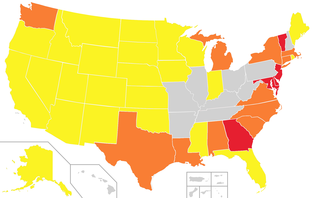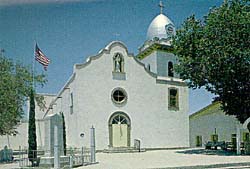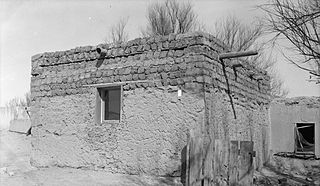Tiwa is a group of two, possibly three, related Tanoan languages spoken by the Tiwa Pueblo, and possibly Piro Pueblo, in the U.S. state of New Mexico.

An Indian reservation is a legal designation for an area of land managed by a federally recognized Indian tribe under the U.S. Bureau of Indian Affairs rather than the state governments of the United States in which they are physically located. Each of the 326 Indian reservations in the United States is associated with a particular Native American nation. Not all of the country's 567 recognized tribes have a reservation—some tribes have more than one reservation, while some share reservations. In addition, because of past land allotments, leading to some sales to non–Native Americans, some reservations are severely fragmented, with each piece of tribal, individual, and privately held land being a separate enclave. This jumble of private and public real estate creates significant administrative, political, and legal difficulties.
The Red Lake shootings were a spree killing that occurred on March 21, 2005, in two places on the Red Lake Indian Reservation in Red Lake, Minnesota, United States. That morning, 16-year-old Jeffrey Weise killed his grandfather and his grandfather's girlfriend at their home. After taking his grandfather's police weapons and bulletproof vest, Weise drove his grandfather's police vehicle to Red Lake Senior High School, where he had been a student some months before.

In the United States, state-recognized tribes are Native American Indian tribes, Nations, or Heritage Groups that do not meet the criteria for Federally recognized Indian tribes, but have been recognized by a process established under assorted state government laws for varying purposes. They may or may not be continually-existing tribal entities, and State recognition does not dictate whether or not they are recognized as Tribal Nations by continually-existing Tribal Nations.

Ysleta is a community in El Paso, Texas, United States. Ysleta was settled between October 9 and October 12, 1680, when Spanish conquistadors, Franciscan clerics and Tigua Indians took refuge along the southern bank of the Rio Grande. These people were fleeing the Pueblo Revolt in New Mexico. Ysleta is the oldest European settlement in the area that is the present-day U.S. state of Texas.
The Jack Abramoff Indian lobbying scandal was a United States political scandal exposed in 2005; it related to fraud perpetrated by political lobbyists Jack Abramoff, Ralph E. Reed Jr., Grover Norquist and Michael Scanlon on Native American tribes who were seeking to develop casino gambling on their reservations. The lobbyists charged the tribes an estimated $85 million in fees. Abramoff and Scanlon grossly overbilled their clients, secretly splitting the multi-million dollar profits. In one case, they secretly orchestrated lobbying against their own clients in order to force them to pay for lobbying services.

Ysleta del Sur Pueblo is a Puebloan Native American tribal entity in the Ysleta section of El Paso, Texas. Its members are Southern Tiwa people who had been displaced from Spanish New Mexico in 1680-1681 during the Pueblo Revolt against the Spaniards.
A tribal chief or chieftain is the leader of a tribal society or chiefdom.
The monetary influence of Jack Abramoff ran deep in Washington, as Jack Abramoff spent millions of dollars to influence and entertain both Republican and Democratic politicians. Abramoff had a reputation for largesse considered exceptional even by Washington standards. In addition to offering many Republican members of Congress expensive free meals at his restaurant, Signatures, Abramoff maintained four skyboxes at major sports arenas for political entertaining at a cost of over $1 million a year. Abramoff hosted many fundraisers at these skyboxes including events for Republican politicians publicly opposed to gambling, such as John Doolittle. Abramoff gave over $260,000 in personal contributions to Republican candidates, politicians, and organizations, and funded numerous trips for politicians and staffers and gave none to Democrats.

Pueblo of Isleta or Isleta Pueblo is an unincorporated community and Tanoan pueblo in Bernalillo County, New Mexico, United States, originally established in the c. 14th century. The Southern Tiwa name of the pueblo is Shiewhibak (Shee-eh-whíb-bak) meaning "a knife laid on the ground to play whib", a traditional footrace. Its people are a federally recognized tribe.
The Tiwa or Tigua are a group of related Tanoan Puebloans in New Mexico. They traditionally speak a Tiwa language, and are divided into the two Northern Tiwa groups, in Taos and Picuris, and the Southern Tiwa in Isleta and Sandia, around what is now Albuquerque, and in Ysleta del Sur near El Paso, Texas.
The Southern Tiwa language is a Tanoan language spoken at Sandia Pueblo and Isleta Pueblo in New Mexico and Ysleta del Sur in Texas.

Cerro Alto Mountain is a mountain in western Texas east of El Paso along U.S. Route 180. It is the highest point in the Hueco Mountains.
Indian and jackrabbits is a two-player abstract strategy board game from the Tiwa tribe of Taos, New Mexico. A similar game with a slightly different board is also played by the Tohono O'odham tribe of Arizona. From the outset, these games look like hunt games similar to Catch the Hare, the Fox games of Europe, and the tiger and leopard games of Asia, because they use very similar boards, and the game mechanics are the same, and the number of pieces each player controls is different. However, they are not the same games, because the goals are completely different. The goal of the one Indian is to capture just one of the twelve jackrabbits. The goal of the jackrabbits is to move themselves safely onto the other side of the board mirroring their initial positions.
Senecú is a small Mexican village, now on the outskirts of Ciudad Juárez, Chihuahua. It is at an altitude of 1123 m. and lies within the Chihuahuan Desert ecosystem.

The Ysleta Mission, located in the Ysleta del Sur Pueblo within the municipality of El Paso, Texas, is recognized as the oldest continuously operated parish in the State of Texas. The Ysleta community is also recognized as the oldest in Texas and claims to have the oldest continuously cultivated plot of land in the United States.
The Pechanga Band of Luiseño Mission Indians is a federally recognized tribe of Luiseño Indians based in Riverside County, California, where their reservation is located. As of 2006, there were 1,370 members of the nation. The tribe owns the Pechanga Resort & Casino in Temecula and the naming rights to the San Diego sports arena now known as the Pechanga Arena.
Legal forms of gambling in the U.S. state of Texas include the Texas Lottery; parimutuel wagering on horse and greyhound racing; charitable bingo, pull-tabs, and raffles; and three Indian casinos.
Tortugas, New Mexico or Tortugas Pueblo is a community in Doña Ana County, New Mexico, just outside of Las Cruces, New Mexico. It was founded in 1852. Tortugas Pueblo, as it is commonly referred to as, was the area of land that was granted to tribal members of the Piro/Manso/Tiwa tribe in Las Cruces. Originally Tortugas was made up of two Native villages, the Pueblo of Guadalupe and the Pueblo of San Juan de Guadalupe. Many of the people living in Tortugas today are members and descendants of the tribe, as well as descendants of various other tribes in the surrounding area including Jumanos, Sumas, Apaches, Conchos, and Rarámuri. Despite being considered extinct Manso Indians are part of the population that make up members of the Tortugas community. The area of land in present-day Las Cruces down the Rio Grande into Juarez, Mexico was the territory of the Manso people before the Spanish came through and before other tribes began moving in. The Tiwa from Isleta Pueblo and Piro people from near Socorro, New Mexico moved into the area after the Pueblo Revolt, when many Native Spanish allies as well and Native slaves of the Spanish, also known as genizaros, traveled south from Santa Fe into Paso del Norte where missions were established for the Natives in the area to attend. Many people in Tortugas are also descendants of Ysleta del Sur Pueblo, a pueblo in Texas that was established after the Pueblo Revolt as well. Despite not being federally recognized, Tortugas has maintained its Native cultural heritage and traditions and has thrived as an inter-tribal community. The current cacique is Patrick Narvaez.






